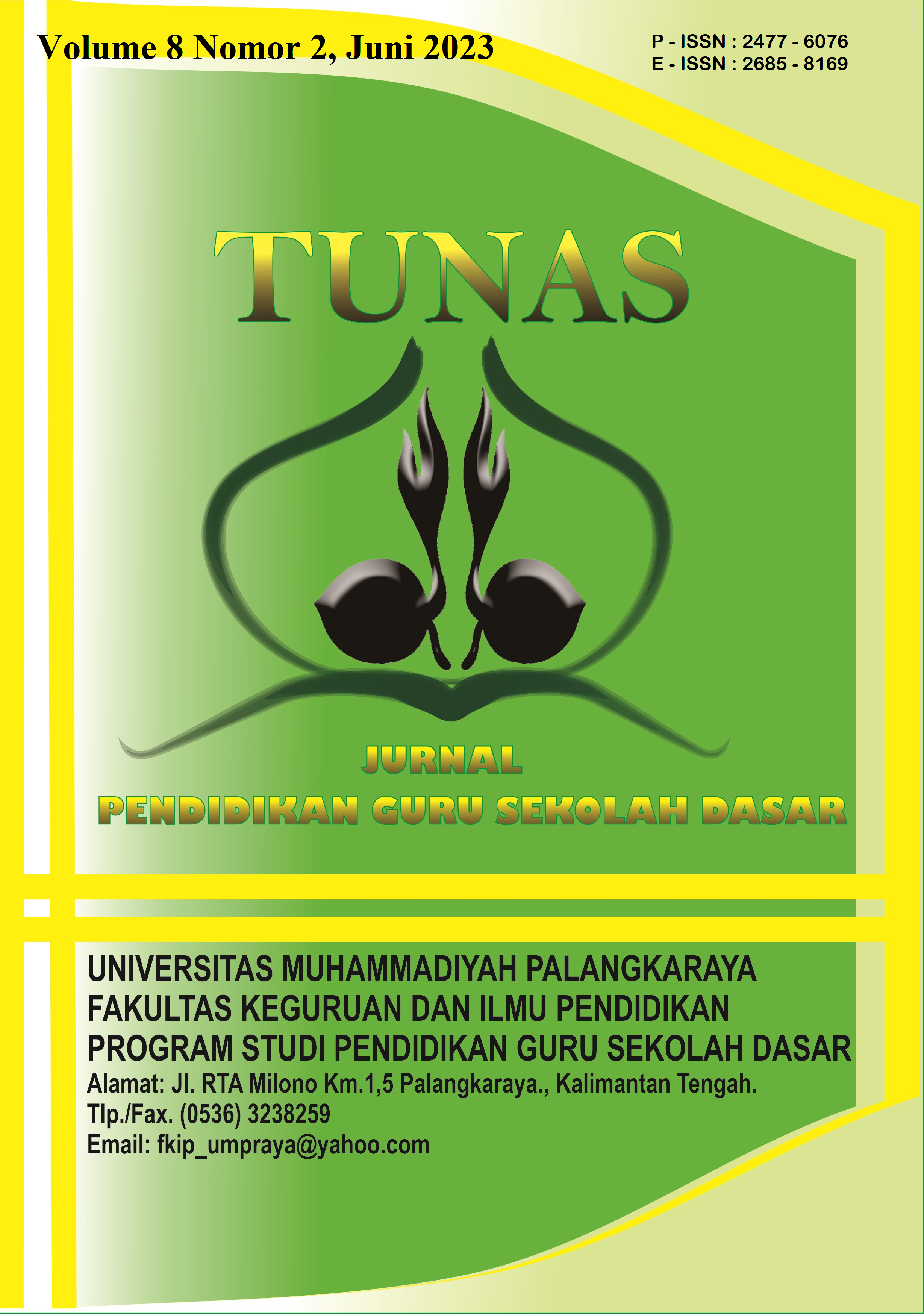Guru Pembimbing Khusus (GPK) di Sekolah Inklusi Palangka Raya Shadow Teacher of Inclusive School in Palangka Raya
Main Article Content
Abstract
Inclusive schools provide opportunities for Children with Special Needs/ Anak Berkebutuhan Khusus (ABK) to study in public schools, and Shadow Teacher/ Guru Pembimbing Khusus (GPK) are an important part of implementing this inclusive school program. This research was conducted to analyze the role and implementation of GPK in Palangka Raya. The results of this study able to applied in inclusive school system and optimize GPK in carrying out their duties in class. The research methodology used is qualitative research and data analysis uses thematic analysis with an inductive approach. The results of this study are, first the role of GPK includes the learning process and encourages social acceptance in the classroom. Second, the pattern of interaction between GPK, schools, and parents influences the optimization of ABK learning at school. Third, GPK has emotional attachment and empathy towards ABK and parents. The conclusion of this study is that there is no standardized procedure for GPK to carry out their duties, but in general GPK is able to do their tasks with the support of their resources. In addition, the pattern of interaction between GPK, parents and schools basically influence the implementation of inclusive education in schools.
Downloads
Article Details

This work is licensed under a Creative Commons Attribution-ShareAlike 4.0 International License.
Authors who publish with this journal agree to the following terms:
- Any article on the copyright is retained by the author(s).
- The author grants the journal, right of first publication with the work simultaneously licensed under a Creative Commons Attribution License that allows others to share work with an acknowledgment of the work authors and initial publications in this journal.
- Authors are able to enter into separate, additional contractual arrangements for the non-exclusive distribution of published articles of work (eg, post-institutional repository) or publish it in a book, with acknowledgment of its initial publication in this journal.
- Authors are permitted and encouraged to post their work online (e.g., in institutional repositories or on their websites) prior to and during the submission process, as can lead to productive exchanges, as well as earlier and greater citation of published work.
- The article and any associated published material is distributed under the Creative Commons Attribution-ShareAlike 4.0 International License
References
Al Mufti, A. Y. (2018). Komparasi Hasil Prestasi Belajar Siswa Sekolah Dasar Inklusi dan Homeschooling. Journal Educative : Journal of Educational Studies, 3(2), 188. https://doi.org/10.30983/educative.v3i2.547
Alamri, W. A. (2019). Effectiveness of Qualitative Research Methods: Interviews and Diaries. International Journal of English and Cultural Studies, 2(1), 65. https://doi.org/10.11114/ijecs.v2i1.4302
Bedha Tamela, Joni Bungai, & Wawan Kartiwa. (2020). Penyelenggaraan Pendidikan Inklusif Anak Berkebutuhan Khusus (Studi Multi Situs di SDN-4 Palangka dan SDN-3 Langkai Kota Palangka Raya). Journal of Environment and Management, 1(2), 134–142. https://doi.org/10.37304/jem.v1i2.1750
Gupta, M., Shaheen, M., & Reddy, K. P. (Eds.). (2019). Qualitative Techniques for Workplace Data Analysis: IGI Global. https://doi.org/10.4018/978-1-5225-5366-3
Hanifah, D. S., Haer, A. B., Widuri, S., & Santoso, M. B. (2022). Tantangan Anak Berkebutuhan Khusus (ABK) Dalam Menjalani Pendidikan Inklusi di Tingkat Sekolah Dasar. Jurnal Penelitian dan Pengabdian Kepada Masyarakat (JPPM), 2(3), 473. https://doi.org/10.24198/jppm.v2i3.37833
Ismiulya, F., Putroe, K. Z., & Rezieka, D. G. (2021). Model Pendidikan Bagi Anak Abk: Home Schooling. Bunayya : Jurnal Pendidikan Anak, 7(2), 63. https://doi.org/10.22373/bunayya.v7i2.10426
Lap, T. Q., & Thao, L. T. (2021). An Analysis of EFL Teachers’ Fear of Failure as Their Motivation for Pursuing Graduate Studies. FOSTER: Journal of English Language Teaching, 2(4), 438–455. https://doi.org/10.24256/foster-jelt.v2i4.60
Makoelle, T. M. (2019). Teacher Empathy: A Prerequisite for an Inclusive Classroom. In M. A. Peters (Ed.), Encyclopedia of Teacher Education (pp. 1–6). Springer Singapore. https://doi.org/10.1007/978-981-13-1179-6_43-1
Mohajan, H. K. (2018). Qualitative Research Methodology in Social Sciences and Related Subjects. Journal of Economic Development, Environment and People, 7(1), 23. https://doi.org/10.26458/jedep.v7i1.571
Novrizaldi, N. (2022, June 6). Pemerintah Wajib Penuhi Hak Pendidikan Inklusif Bagi Penyandang Disabilitas. https://www.kemenkopmk.go.id/pemerintah-wajib-penuhi-hak-pendidikan-inklusif-bagi-penyandang-disabilitas
Nugraheni, D., Rosida, L., & Illiandri, O. (2022). Pendidikan Inklusi Terhadap Anak Berkebutuhan Khusus.
Paccaud, A., Keller, R., Luder, R., Pastore, G., & Kunz, A. (2021). Satisfaction With the Collaboration Between Families and Schools – The Parent’s View. Frontiers in Education, 6, 646878. https://doi.org/10.3389/feduc.2021.646878
Pramartha, I. N. B. (2015). Sejarah dan Sistem Pendidikan Sekolah Luar Biasa Bagian A Negeri Denpasar Bali. HISTORIA, 3(2), 67. https://doi.org/10.24127/hj.v3i2.274
Qiftiyah, M., & Calista, W. (2021). Shadow Teacher for Special Needs Students: Case Study Class VI Taman Muda Ibu Pawiyatan Yogyakarta. EduHumaniora | Jurnal Pendidikan Dasar Kampus Cibiru, 13(1), 26–35. https://doi.org/10.17509/eh.v13i1.26273
Rashid, T., & Asghar, H. M. (2016). Technology use, self-directed learning, student engagement and academic performance: Examining the interrelations. Computers in Human Behavior, 63, 604–612. https://doi.org/10.1016/j.chb.2016.05.084
Ringwald, W. R., & Wright, A. G. C. (2021). The Affiliative Role of Empathy in Everyday Interpersonal Interactions. European Journal of Personality, 35(2), 197–211. https://doi.org/10.1002/per.2286
Sharma, Y. P., & Singh, A. V. (2012). The Role of Emotional Attachment of Teachers in the Development of Self-confidence, Learning Habits and Social Adjustment of Children in the Primary Schools. 3(10).
Suharsiwi, S. (2017). Pendidikan Anak Berkebutuhan Khusus. https://repository.umj.ac.id/2329/1/BUKU%20ABK_SW.pdf
Tarnoto, N. (2016). Permasalahan-permasalahan yang Dihadapi Sekolah Penyelenggara Pendidikan Inklusi pada Tingkat SD. HUMANITAS, 13(1), 50. https://doi.org/10.26555/humanitas.v13i1.3843
Wardah, E. Y. (2019). Peranan Guru Pembimbing Khusus Lulusan Non-Pendidikan Luar Biasa (PLB) Terhadap Pelayanan Anak Berkebutuhan Khusus di Sekolah Inklusi Kabupaten Lumajang. JPI (Jurnal Pendidikan Inklusi), 2(2), 93. https://doi.org/10.26740/inklusi.v2n2.p93-108
Wijaya, S., Supena, A., & Yufiarti. (2023). Implementasi Program Pendidikan Inklusi Pada Sekolah Dasar di Kota Serang. Jurnal Educatio FKIP UNMA, 9(1), 347–357. https://doi.org/10.31949/educatio.v9i1.4592
Zakia, D. L. (2015). Guru Pembimbing Khusus (GPK): Pilar Pendidikan Inklusi. Prosiding Ilmu Pendidikan, 1(2). https://jurnal.fkip.uns.ac.id/index.php/pip/article/view/7529
